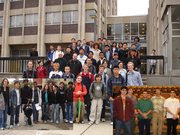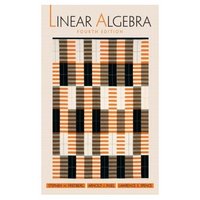06-240/About This Class: Difference between revisions
Adamgolding (talk | contribs) |
|||
| Line 18: | Line 18: | ||
===Text Book(s)=== |
===Text Book(s)=== |
||
Our main text book will be ''Linear Algebra'' (fourth edition) by Friedberg, Insel and Spence, ISBN 0-13-008451-4; it is a required reading. I am told that Schaum’s ''Outline of Linear Algebra'', ISBN 0-07-136200-2, may contain useful examples; it is not a required reading. |
Our main text book will be ''Linear Algebra'' (fourth edition) by Friedberg, Insel and Spence, ISBN 0-13-008451-4; it is a required reading. I am told that Schaum’s ''Outline of Linear Algebra'', ISBN 0-07-136200-2, may contain useful examples; it is not a required reading. |
||
Please note that the eratta for various printings of the 4th edition of the text is available from the publisher here: |
|||
http://www.math.ilstu.edu/linalg/errata.html |
|||
===Wiki=== |
===Wiki=== |
||
Revision as of 23:16, 5 September 2006
| ||||||||||||||||||||||||||||||||||||||||||||||||||||||
Crucial Information
Agenda: Understand linear algebra, the simplest algebra there is, and come to appreciate that simplest is also the most fundamental.
Hidden Agenda: Learn (by example) how "real" math is done: abstraction and generalization, definitions, theorems and proofs.
Instructor: Dror Bar-Natan, drorbn@math.toronto.edu, Bahen 6178, 416-946-5438. Office hours: by appointment.
Classes: Tuesdays 1-3 and Thursdays 1-2 at MP 203.
| Teaching Assistants: Dmitry Donin, donin@math.toronto.edu, Bahen 6191, 416-978-2095 and Paul Lee, plee@math.toronto.edu, Bahen 6135, 416-978-4794.
Tutorials: Thursdays 2-4 at MP 203 if the last digit of your student number is even, and at MP 118 if it is odd. |
URL: https://drorbn.net/drorbn/index.php?title=06-240.
Abstract
Taken from the Faculty of Arts and Science Calendar:
A theoretical approach to: vector spaces over arbitrary fields including [math]\displaystyle{ {\mathbb C} }[/math], [math]\displaystyle{ {\mathbb Z}_p }[/math]. Subspaces, bases and dimension. Linear transformations, matrices, change of basis, similarity, determinants. Polynomials over a field (including unique factorization, resultants). Eigenvalues, eigenvectors, characteristic polynomial, diagonalization. Minimal polynomial, Cayley-Hamilton theorem.
- Prerequisite: MCB4U, MGA4U
- Co-requisite: MAT157Y1
Text Book(s)
Our main text book will be Linear Algebra (fourth edition) by Friedberg, Insel and Spence, ISBN 0-13-008451-4; it is a required reading. I am told that Schaum’s Outline of Linear Algebra, ISBN 0-07-136200-2, may contain useful examples; it is not a required reading.
Please note that the eratta for various printings of the 4th edition of the text is available from the publisher here: http://www.math.ilstu.edu/linalg/errata.html
Wiki
The class web site is a wiki, as in Wikipedia - meaning that anyone can and is welcome to edit almost anything and in particular, students can post notes, comments, pictures, whatever. Some rules, though -
- This wiki is a part of my (Dror's) academic web page. All postings on it must be class-related (or related to one of the other projects I'm involved with).
- If there's no specific reason for your edit to be anonymous, please log in and don't have it anonymous.
- Criticism is fine, but no insults or foul language, please.
- I (Dror) will allow myself to exercise editorial control, when necessary.
- The titles of all pages related to this class should begin with "06-240/", just like the title of this page.
Some further editing help is available at Help:Contents.
Marking Scheme
There will be one term test (25% of the total grade) and a final exam (50%), as well as about 10 homework assignments (25%).
The Term Test
The term test will take place in class on Tuesday October 24th. A student who misses the term test without providing a valid reason (for example, a doctor’s note) within one week of the test will receive a mark of 0 on the term test. There will be no make-up term test. If a student misses the term test for a valid reason, the weight of the problem sets will increase to 35% and the weight of the final exam to 65%.
Homework
Assignments will be posted on the course web page and distributed in class (usually on Thursdays) on the weeks shown in the class timeline. They will be due a week later at the tutorials and they will be (at least partially) marked by the TAs. All students (including those who join the course late) will receive a mark of 0 on each assignment not handed in; though in computing the homework grade, your worst two assignments will not count. I encourage you to discuss the assignments with other students or even browse the web, so long as you do at least some of the thinking on your own and you write up your own solutions. Remember that cheating is always possible and may increase your homework grade a bit. But it will hurt your exam grades a lot more.
Good Deeds
Students will be able to earn up to 25 "good deeds" points throughout the year for doing services to the class as a whole. There is no pre-set system for awarding these points, but the following will definitely count:
- Drawing a beautiful picture to illustrate a point discussed in class and posting it on this site.
- Taking class notes in nice handwriting, scanning them and posting them here.
- Typing up or formatting somebody else's class notes, correcting them or expanding them in any way.
- Writing an essay on expanding on anything mentioned in class and posting it here; correcting or expanding somebody else's article.
- Doing anything on our 06-240/To do list.
- Any other service to the class as a whole.
Good deed points will count towards your final grade! If you got [math]\displaystyle{ n }[/math] of those, they are solidly your and the formula for the final grade below will only be applied to the remaining [math]\displaystyle{ 100-n }[/math] points. So if you got 25 good deed points (say) and your final grade is 80, I will report your grade as [math]\displaystyle{ 25+80(100-25)/100=85 }[/math]. Yet you can get an overall 100 even without doing a single good deed.
Important. For your good deeds to count, you must do them under your own name. So you must set up an account for yourself on this wiki and you must use it whenever you edit something. I will periodically check Recent changes to assign good deeds credits.
Class Photo
To help me learn your names, I will take a class photo on Thursday of the third week of classes. I will post the picture on the class' web site and you will be required to send me an email and identify yourself in the picture or to identify yourself on the Class Photo page of this wiki.
How to Succeed in this Class
- Keep up! Don't fall behind on reading, listening, and doing assignments! University goes at a different pace than high school. New material is covered once and just once. There will be no going over the same thing again and again - if you fall behind, you stay behind. Unless you are an Einstein, there is no way to do well in this class merely by attending lectures - you must think about the material more than 3 or 5 hours a week if you want it to sink in. And if you are planning on not attending lectures, well, think again. Most people find it very hard to pace their own studies without a human contact; if you'll try, you are likely to discover the hard way that you belong to the majority.
- If in high school you were the best in your class in math, now remember that everybody around you was the same. You may find that what was enough then simply doesn't cut it any more. Try to catch that early in the year!
- Math is about understanding, not about memorizing. To understand is to internalize; it is to come to the point where whatever the professor does on the blackboard or whatever is printed in the books becomes yours; it is to come to the point where you appreciate why everything is done the way it is done, what does it mean, what are the reasons and motivations and what is it all good for. Don't settle for less!
- Keep asking yourself questions; many of them will be answered in class, but not all. Remember the old Chinese proverb:
The saddest that can happen to you in this class is if you won't notice the door being opened.


